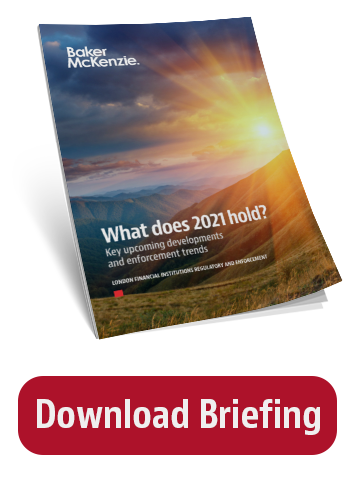In brief
In 2020, the COVID-19 pandemic swept away regulatory plans and programmes for the year while regulators rushed to stabilise the markets and protect consumers in distress. Regulators across the globe, just like financial institutions and other businesses, scrambled to implement remote working arrangements and keep their employees safe while adjusting their supervisory processes and plans. Regulatory programmes were postponed or reoriented, and supervisors quickly developed regulatory measures to help provide pandemic relief to both firms and their customers.
Contents
As dawn begins to break on 2021, what can we expect to be at the top of regulators’ agendas? No doubt mitigation and relief efforts relating to the pandemic will continue to demand significant attention from regulators worldwide, with priorities shifting as, with any luck, global communities are able to begin their efforts to recover and return to a position of normality. However, we think that position of normality will be far from the pre-pandemic “business as usual” position – regulators will be keen not only to take forward the lessons learned in potentially reshaping and reforming regulations that have proven to be less than fit for purpose, but also to ensure that firms are using their experiences from the pandemic’s real-time “stress test” scenario to review and adjust their own business models, policies and procedures to address key gaps identified.
In our briefing looking ahead to 2021, What does 2021 hold? we explore forthcoming developments and regulatory priorities in a number of key areas, including:
- Financial crime and market conduct
- Sustainability
- Tech, innovation and data
- Crypto
- Risk, governance and oversight
- Consumer protection
- Prudential reform
- The future UK financial services framework
Our regulatory experts discussed these themes further in our four-part virtual series in order to help our clients navigate the regulatory landscape in 2021 – starting with a panel discussion for UK and EU financial institutions on moving beyond Brexit. You can access the recordings below:
Part I – Looking Ahead to 2021: Moving Beyond Brexit
Our lawyers discussed managing the transition (short and long-term “fixes” for continued market access), whether equivalence is a workable long-term solution, complying with onshored regulation and a dual regulatory framework, the evolution of the post-Brexit regulatory landscape, and the potential for divergence.
Moderated by: Caitlin McErlane
Panelists: Mark Simpson, Tim Alferink, Manuel Lorenz, Iris Barsan
Part II – 2021 Outlook: Key Regulatory Developments to Watch
Our lawyers discussed key regulatory developments for compliance officers and GCs to watch in 2021, including upcoming prudential reforms, and the IFR/IFD; developments in markets and trading regulation; key risk, governance and reporting updates; and implementation of the SFDR and the UK’s approach to ESG regulation.
Moderated by: Mark Simpson
Panelists: Caitlin McErlane, Guy Stevenson, Oliver Pike, Shaneil Shah
Part III – The Digital Consumer in 2021: Hot Topics for Firms
At this session, our lawyers talked about key regulatory hot topics for 2021 in the fintech, payments and consumer spaces, including upcoming developments in technology, innovation and data; cybersecurity hot topics; the shape of the payments landscape in 2021; and the focus on consumer protection.
Moderated by: Mark Simpson
Panelists: Paul Glass, Sue McLean, Julian Hui, Guy Stevenson, Sarah Williams
Part IV – Enforcement, Financial Crime and Market Conduct Update
Our lawyers lead a panel discussion on a review of regulatory enforcement in 2020 and expectations for 2021; key updates relating to financial crime; and developments in market conduct and integrity.
Moderated by: Caitlin McErlane
Panelists: Mark Simpson, Marc Thorley, Guy Stevenson, Kimberly Everitt




